
island-ai
None
Stars: 134
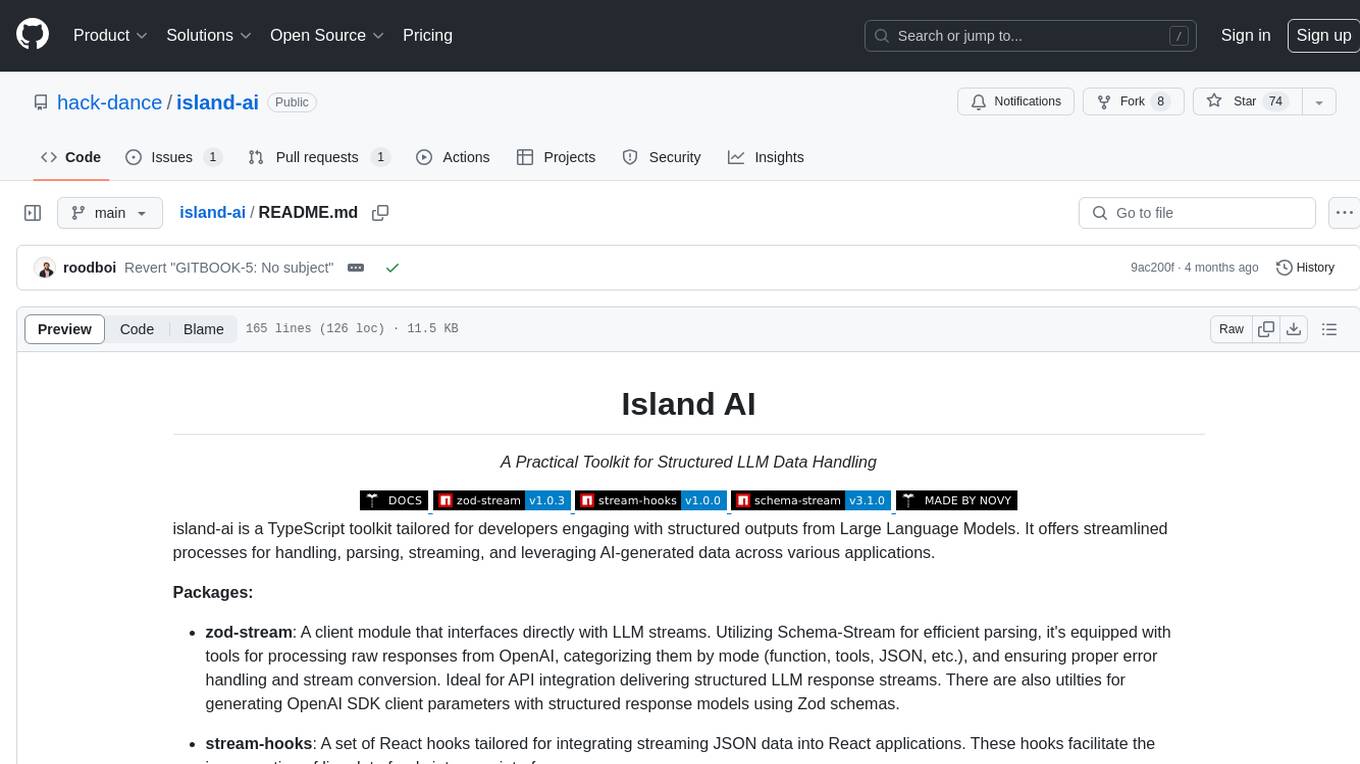
island-ai is a TypeScript toolkit tailored for developers engaging with structured outputs from Large Language Models. It offers streamlined processes for handling, parsing, streaming, and leveraging AI-generated data across various applications. The toolkit includes packages like zod-stream for interfacing with LLM streams, stream-hooks for integrating streaming JSON data into React applications, and schema-stream for JSON streaming parsing based on Zod schemas. Additionally, related packages like @instructor-ai/instructor-js focus on data validation and retry mechanisms, enhancing the reliability of data processing workflows.
README:
> A TypeScript toolkit for building structured LLM data handling pipelines
Island AI is a collection of low-level utilities and high-level tools for handling structured data streams from LLMs. The packages range from basic JSON streaming parsers to complete LLM clients, giving you the flexibility to build custom solutions or use pre-built integrations.
A foundational streaming JSON parser that enables immediate data access through structured stubs.
Key Features:
- Streaming JSON parser with typed outputs
- Default value support
- Path completion tracking
- Nested object and array support
import { SchemaStream } from "schema-stream";
import { z } from "zod";
// Define complex nested schemas
const schema = z.object({
layer1: z.object({
layer2: z.object({
value: z.string(),
layer3: z.object({
layer4: z.object({
layer5: z.string()
})
})
})
}),
someArray: z.array(z.object({
someString: z.string(),
someNumber: z.number()
}))
});
// Get a readable stream of json (from an api or otherwise)
async function getSomeStreamOfJson(
jsonString: string
): Promise<{ body: ReadableStream }> {
const stream = new ReadableStream({
start(controller) {
const encoder = new TextEncoder()
const jsonBytes = encoder.encode(jsonString)
for (let i = 0; i < jsonBytes.length; ) {
const chunkSize = Math.floor(Math.random() * 5) + 2
const chunk = jsonBytes.slice(i, i + chunkSize)
controller.enqueue(chunk)
i += chunkSize
}
controller.close()
},
})
return { body: stream }
}
// Create parser with completion tracking
const parser = new SchemaStream(schema, {
onKeyComplete({ completedPaths }) {
console.log('Completed paths:', completedPaths);
}
});
// Get the readabale stream to parse
const readableStream = await getSomeStreamOfJson(
`{"someString": "Hello schema-stream", "someNumber": 42000000}`
)
// Parse streaming data
const stream = parser.parse();
readableStream.pipeThrough(stream);
// Get typed results
const reader = stream.readable.getReader();
const decoder = new TextDecoder()
let result = {}
let complete = false
while (true) {
const { value, done } = await reader.read();
complete = done
if (complete) break;
result = JSON.parse(decoder.decode(value));
// result is fully typed based on schema
}Extends schema-stream with OpenAI integration and Zod-specific features.
Key Features:
- OpenAI completion streaming
- Multiple response modes (TOOLS, FUNCTIONS, JSON, etc.)
- Schema validation during streaming
import { OAIStream } from "zod-stream";
import { withResponseModel } from "zod-stream";
import { z } from "zod";
// Define extraction schema
const ExtractionSchema = z.object({
users: z.array(z.object({
name: z.string(),
handle: z.string(),
twitter: z.string()
})).min(3),
location: z.string(),
budget: z.number()
});
// Configure OpenAI params with schema
const params = withResponseModel({
response_model: {
schema: ExtractionSchema,
name: "Extract"
},
params: {
messages: [{ role: "user", content: textBlock }],
model: "gpt-4"
},
mode: "TOOLS"
});
// Stream completions
const stream = OAIStream({
res: await oai.chat.completions.create({
...params,
stream: true
})
});
// Process results
const client = new ZodStream();
const extractionStream = await client.create({
completionPromise: () => stream,
response_model: {
schema: ExtractionSchema,
name: "Extract"
}
});
for await (const data of extractionStream) {
console.log('Progressive update:', data);
}React hooks for consuming streaming JSON data with Zod schema validation.
Key Features:
- Ready-to-use React hooks
- Automatic schema validation
- Progress tracking
- Error handling
import { useJsonStream } from "stream-hooks";
function DataViewer() {
const { loading, startStream, data, error } = useJsonStream({
schema: ExtractionSchema,
onReceive: (update) => {
console.log('Progressive update:', update);
},
});
return (
<div>
{loading && <div>Loading...</div>}
{error && <div>Error: {error.message}</div>}
{data && (
<pre>{JSON.stringify(data, null, 2)}</pre>
)}
<button onClick={() => startStream({
url: "/api/extract",
method: "POST",
body: { text: "..." }
})}>
Start Extraction
</button>
</div>
);
}Structured evaluation tools for assessing LLM outputs across multiple dimensions. Built with TypeScript and integrated with OpenAI and Instructor, it enables both automated evaluation and human-in-the-loop assessment workflows.
Key Features:
- 🎯 Model-Graded Evaluation: Leverage LLMs to assess response quality
- 📊 Accuracy Measurement: Compare outputs using semantic and lexical similarity
- 🔍 Context Validation: Evaluate responses against source materials
- ⚖️ Composite Assessment: Combine multiple evaluation types with custom weights
// Combine different evaluator types
const compositeEval = createWeightedEvaluator({
evaluators: {
entities: createContextEvaluator({ type: "entities-recall" }),
accuracy: createAccuracyEvaluator({
weights: {
factual: 0.9, // High weight on exact matches
semantic: 0.1 // Low weight on similar terms
}
}),
quality: createEvaluator({
client: oai,
model: "gpt-4-turbo",
evaluationDescription: "Rate quality"
})
},
weights: {
entities: 0.3,
accuracy: 0.4,
quality: 0.3
}
});
// Must provide all required fields for each evaluator type
await compositeEval({
data: [{
prompt: "Summarize the earnings call",
completion: "CEO Jane Smith announced 15% growth",
expectedCompletion: "The CEO reported strong growth",
groundTruth: "CEO discussed Q3 performance",
contexts: [
"CEO Jane Smith presented Q3 results",
"Company saw 15% growth in Q3 2023"
]
}]
});A universal LLM client that extends the OpenAI SDK to provide consistent interfaces across different providers that may not follow the OpenAI API specification.
Native API Support Status:
| Provider API | Status | Chat | Basic Stream | Functions/Tool calling | Function streaming | Notes |
|---|---|---|---|---|---|---|
| OpenAI | ✅ | ✅ | ✅ | ✅ | ✅ | Direct SDK proxy |
| Anthropic | ✅ | ✅ | ✅ | ❌ | ❌ | Claude models |
| ✅ | ✅ | ✅ | ✅ | ❌ | Gemini models + context caching | |
| Azure | 🚧 | ✅ | ✅ | ❌ | ❌ | OpenAI model hosting |
| Cohere | ❌ | - | - | - | - | Not supported |
| AI21 | ❌ | - | - | - | - | Not supported |
Stream Types:
- Basic Stream: Simple text streaming
- Partial JSON Stream: Progressive JSON object construction during streaming
- Function Stream: Streaming function/tool calls and their results
OpenAI-Compatible Hosting Providers:
These providers use the OpenAI SDK format, so they work directly with the OpenAI client configuration:
| Provider | How to Use | Available Models |
|---|---|---|
| Together | Use OpenAI client with Together base URL | Mixtral, Llama, OpenChat, Yi, others |
| Anyscale | Use OpenAI client with Anyscale base URL | Mistral, Llama, others |
| Perplexity | Use OpenAI client with Perplexity base URL | pplx-* models |
| Replicate | Use OpenAI client with Replicate base URL | Various open models |
Key Features:
- OpenAI-compatible interface for non-OpenAI providers
- Support for major providers:
- OpenAI (direct SDK proxy)
- Anthropic (Claude models)
- Google (Gemini models)
- Together
- Microsoft/Azure
- Anyscale
- Streaming support across providers
- Function/tool calling compatibility
- Context caching for Gemini
- Structured output support
import { createLLMClient } from "llm-polyglot";
// Create provider-specific client
const anthropicClient = createLLMClient({
provider: "anthropic"
});
// Use consistent OpenAI-style API
const completion = await anthropicClient.chat.completions.create({
model: "claude-3-opus-20240229",
max_tokens: 1000,
messages: [{ role: "user", content: "Extract data..." }]
});// Anthropic Streaming
const stream = await anthropicClient.chat.completions.create({
model: "claude-3-opus-20240229",
max_tokens: 1000,
stream: true,
messages: [{ role: "user", content: "Stream some content..." }]
});
let content = "";
for await (const chunk of stream) {
content += chunk.choices?.[0]?.delta?.content ?? "";
}
// Google/Gemini with Context Caching
const googleClient = createLLMClient({
provider: "google"
});
// Create a context cache
const cache = await googleClient.cacheManager.create({
model: "gemini-1.5-flash-8b",
messages: [{
role: "user",
content: "What is the capital of Montana?"
}],
ttlSeconds: 3600, // Cache for 1 hour
max_tokens: 1000
});
// Use cached context in new completion
const completion = await googleClient.chat.completions.create({
model: "gemini-1.5-flash-8b",
messages: [{
role: "user",
content: "What state is it in?"
}],
additionalProperties: {
cacheName: cache.name
},
max_tokens: 1000
});const completion = await anthropicClient.chat.completions.create({
model: "claude-3-opus-20240229",
max_tokens: 1000,
messages: [{
role: "user",
content: "Extract user information..."
}],
tool_choice: {
type: "function",
function: { name: "extract_user" }
},
tools: [{
type: "function",
function: {
name: "extract_user",
description: "Extract user information",
parameters: {
type: "object",
properties: {
name: { type: "string" },
age: { type: "number" }
},
required: ["name", "age"]
}
}
}]
});// Using with OpenAI-compatible providers:
const client = createLLMClient({
provider: "openai",
apiKey: "your_api_key",
baseURL: "https://api.together.xyz/v1", // or other provider URLs
});-
Anthropic (Claude)
- Full function/tool calling support
- Message streaming
- OpenAI-compatible responses
-
Google (Gemini)
- Context caching for token optimization
- Streaming support
- Function calling
- Optional OpenAI compatibility mode
- Grounding (i.e. Google Search) support
-
OpenAI
- Direct SDK proxy
- All native OpenAI features supported
The core Island AI packages provides more low-level utilities for building custom LLM clients and data handling pipelines (schema-stream, zod-stream, stream-hooks). For a complete, ready-to-use solution, check out Instructor, which composes some of these tools into a full-featured client.
When to use core packages:
- You need direct access to the HTTP stream for custom transport (e.g., not using SSE/WebSockets)
- You want to build a custom LLM client
- You need fine-grained control over streaming and parsing
- You're implementing server-side streaming with client-side parsing
- You need a structured evaluation tool
- You want to use different LLM providers that don't support the OpenAI SDK format
When to use Instructor:
- You want a complete solution for structured extraction
- You're using WebSocket-based streaming from server to client
- You're requests are only on the server
- You need the full async generator pattern for progressive object updates
- You want OpenAI SDK compatibility out of the box
For cases where you need direct control over the HTTP stream, you can use the core packages to build your own streaming endpoints:
import { OAIStream } from "zod-stream";
import { withResponseModel } from "zod-stream";
import OpenAI from "openai";
import { z } from "zod";
const oai = new OpenAI({
apiKey: process.env.OPENAI_API_KEY,
organization: process.env.OPENAI_ORG_ID
});
// Define your schema
const schema = z.object({
content: z.string(),
users: z.array(z.object({
name: z.string(),
})),
});
// API Route Example (Next.js)
export async function POST(request: Request) {
const { messages } = await request.json();
// Configure OpenAI parameters with schema
const params = withResponseModel({
response_model: {
schema: schema,
name: "Users extraction and message"
},
params: {
messages,
model: "gpt-4",
},
mode: "TOOLS",
});
// Create streaming completion
const extractionStream = await oai.chat.completions.create({
...params,
stream: true,
});
// Return streaming response
return new Response(
OAIStream({ res: extractionStream })
);
}
// Client-side consumption
async function consumeStream() {
const response = await fetch('/api/extract', {
method: 'POST',
body: JSON.stringify({
messages: [{ role: 'user', content: 'Your prompt here' }]
})
});
const parser = new SchemaStream(schema);
const stream = parser.parse();
response.body
?.pipeThrough(stream)
.pipeTo(new WritableStream({
write(chunk) {
const data = JSON.parse(new TextDecoder().decode(chunk));
// Use partial data as it arrives
console.log('Partial data:', data);
}
}));
}

Instructor provides a high-level client that composes Island AI's core packages into a complete solution for structured extraction. It extends the OpenAI client with streaming and schema validation capabilities.
import Instructor from "@instructor-ai/instructor";
import OpenAI from "openai";
import { z } from "zod";
// Define your extraction schema
const ExtractionSchema = z.object({
users: z.array(
z.object({
name: z.string(),
handle: z.string(),
twitter: z.string()
})
).min(3),
location: z.string(),
budget: z.number()
});
type Extraction = Partial<z.infer<typeof ExtractionSchema>>;
// Initialize OpenAI client with Instructor
const oai = new OpenAI({
apiKey: process.env.OPENAI_API_KEY,
organization: process.env.OPENAI_ORG_ID
});
const client = Instructor({
client: oai,
mode: "TOOLS"
});
// Stream completions with structured output
const extractionStream = await client.chat.completions.create({
messages: [{
role: "user",
content: "Your text content here..."
}],
model: "gpt-4",
response_model: {
schema: ExtractionSchema,
name: "Extract"
},
max_retries: 3,
stream: true,
stream_options: {
include_usage: true
}
});
// Process streaming results
let extraction: Extraction = {};
for await (const result of extractionStream) {
extraction = result;
console.log('Progressive update:', result);
}
console.log('Final extraction:', extraction);-
Instructor
- Provides a complete solution built on top of the OpenAI SDK
- Handles retries, validation, and streaming automatically
- Returns an async generator for progressive updates
- Ideal for WebSocket-based streaming from server to client
- Simpler integration when you don't need low-level control
-
Direct HTTP Streaming
- Gives you direct access to the HTTP stream
- Allows custom transport mechanisms
- Enables server-side streaming with client-side parsing
- More flexible for custom implementations
- Better for scenarios where you need to minimize server processing
We welcome contributions! Check out our issues labeled as good-first-issue or help-wanted.
For detailed documentation, visit https://island.hack.dance
MIT License - see LICENSE file for details.
For Tasks:
Click tags to check more tools for each tasksFor Jobs:
Alternative AI tools for island-ai
Similar Open Source Tools

island-ai
island-ai is a TypeScript toolkit tailored for developers engaging with structured outputs from Large Language Models. It offers streamlined processes for handling, parsing, streaming, and leveraging AI-generated data across various applications. The toolkit includes packages like zod-stream for interfacing with LLM streams, stream-hooks for integrating streaming JSON data into React applications, and schema-stream for JSON streaming parsing based on Zod schemas. Additionally, related packages like @instructor-ai/instructor-js focus on data validation and retry mechanisms, enhancing the reliability of data processing workflows.
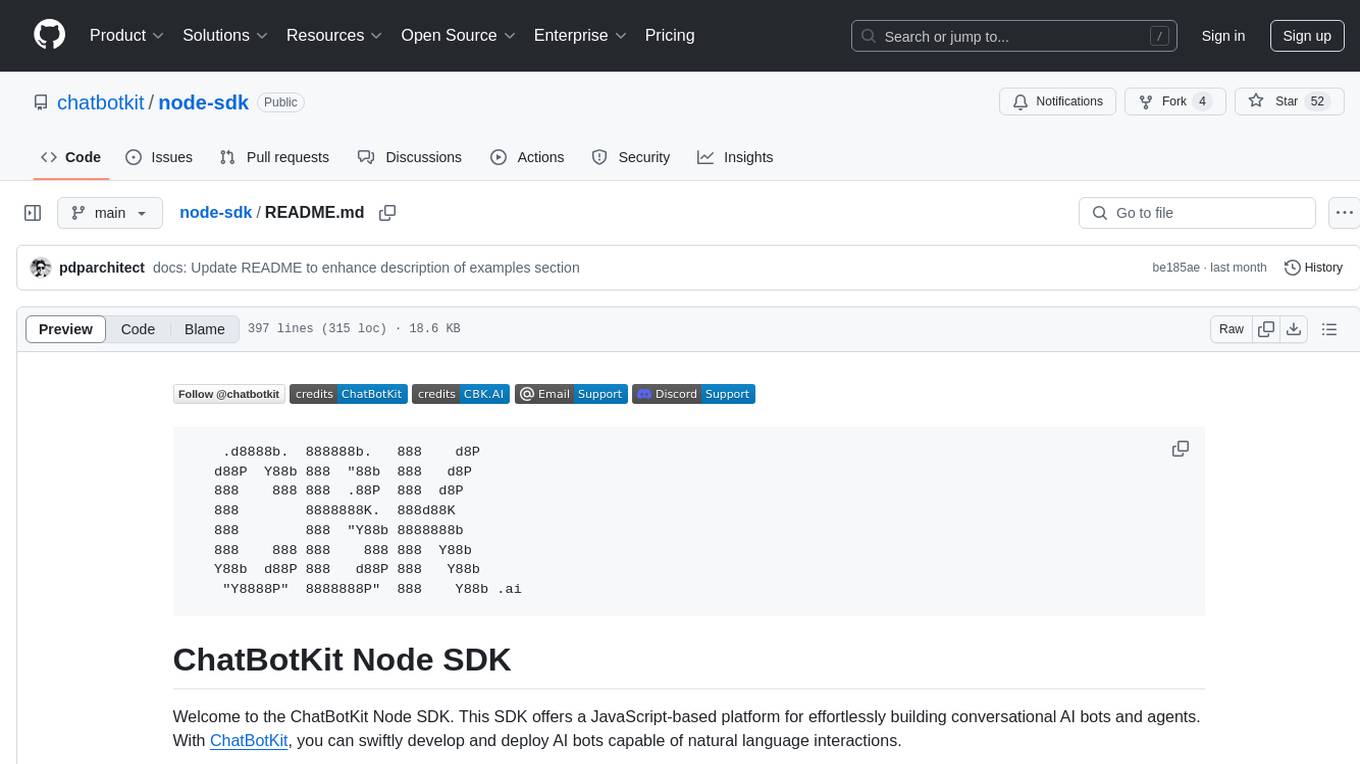
node-sdk
The ChatBotKit Node SDK is a JavaScript-based platform for building conversational AI bots and agents. It offers easy setup, serverless compatibility, modern framework support, customizability, and multi-platform deployment. With capabilities like multi-modal and multi-language support, conversation management, chat history review, custom datasets, and various integrations, this SDK enables users to create advanced chatbots for websites, mobile apps, and messaging platforms.
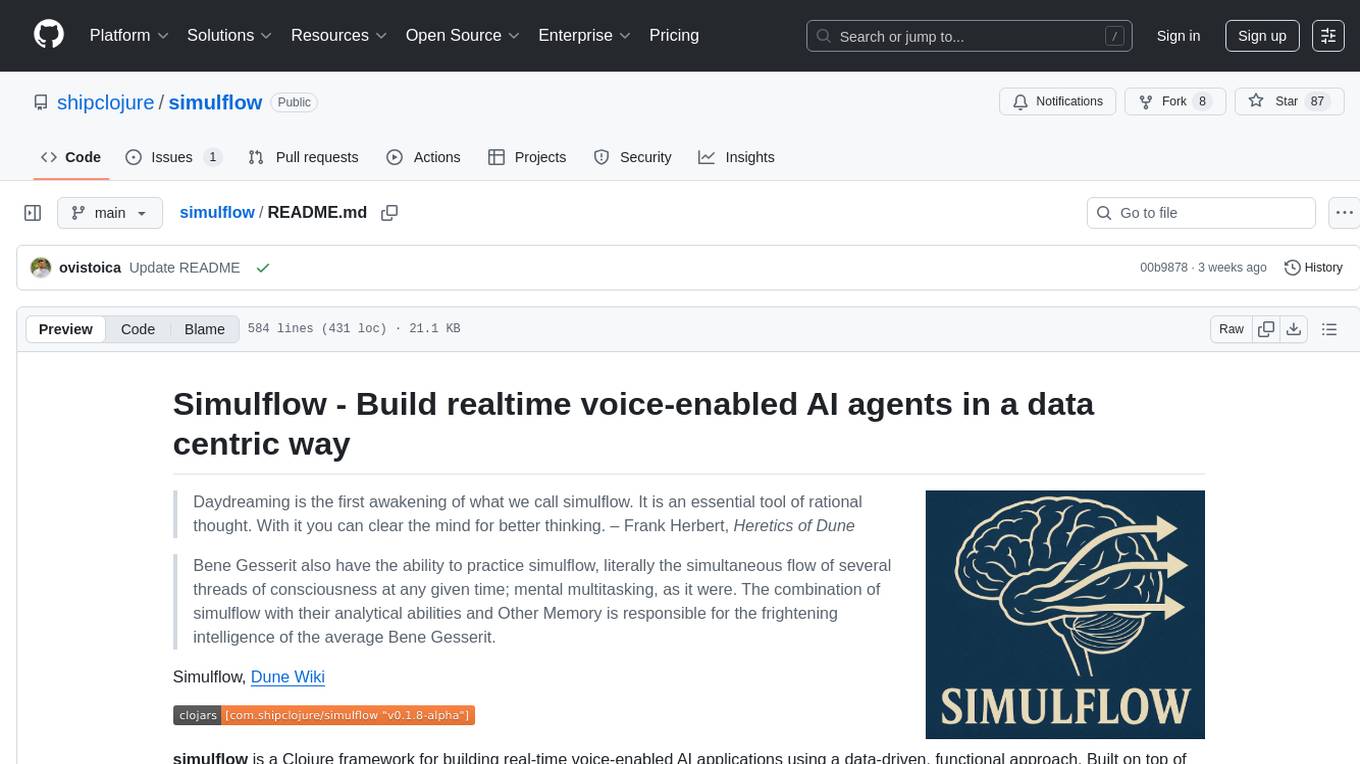
simulflow
Simulflow is a Clojure framework for building real-time voice-enabled AI applications using a data-driven, functional approach. It provides a composable pipeline architecture for processing audio, text, and AI interactions with built-in support for major AI providers. The framework uses processors that communicate through specialized frames to create voice-enabled AI agents, allowing for mental multitasking and rational thought. Simulflow offers a flow-based architecture, data-first design, streaming architecture, extensibility, flexible frame system, and built-in services for seamless integration with major AI providers. Users can easily swap components, add new functionality, or debug individual stages without affecting the entire system.
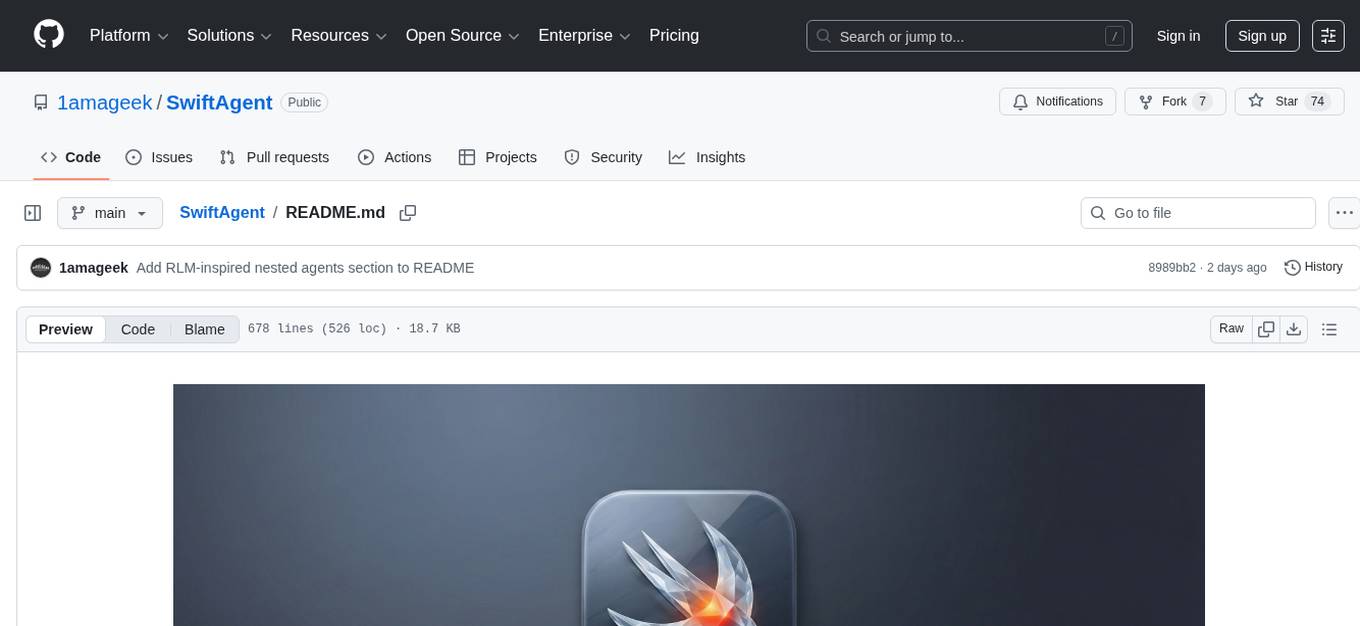
SwiftAgent
A type-safe, declarative framework for building AI agents in Swift, SwiftAgent is built on Apple FoundationModels. It allows users to compose agents by combining Steps in a declarative syntax similar to SwiftUI. The framework ensures compile-time checked input/output types, native Apple AI integration, structured output generation, and built-in security features like permission, sandbox, and guardrail systems. SwiftAgent is extensible with MCP integration, distributed agents, and a skills system. Users can install SwiftAgent with Swift 6.2+ on iOS 26+, macOS 26+, or Xcode 26+ using Swift Package Manager.
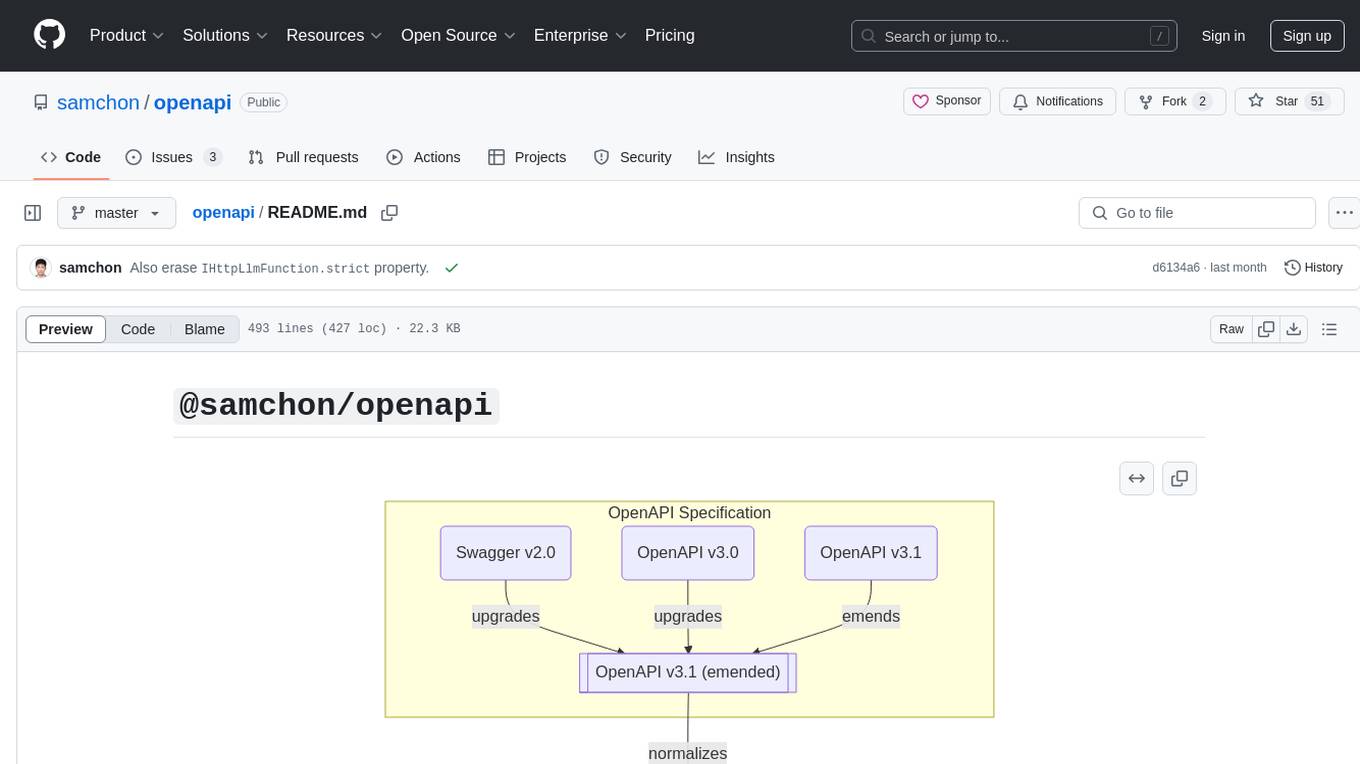
openapi
The `@samchon/openapi` repository is a collection of OpenAPI types and converters for various versions of OpenAPI specifications. It includes an 'emended' OpenAPI v3.1 specification that enhances clarity by removing ambiguous and duplicated expressions. The repository also provides an application composer for LLM (Large Language Model) function calling from OpenAPI documents, allowing users to easily perform LLM function calls based on the Swagger document. Conversions to different versions of OpenAPI documents are also supported, all based on the emended OpenAPI v3.1 specification. Users can validate their OpenAPI documents using the `typia` library with `@samchon/openapi` types, ensuring compliance with standard specifications.
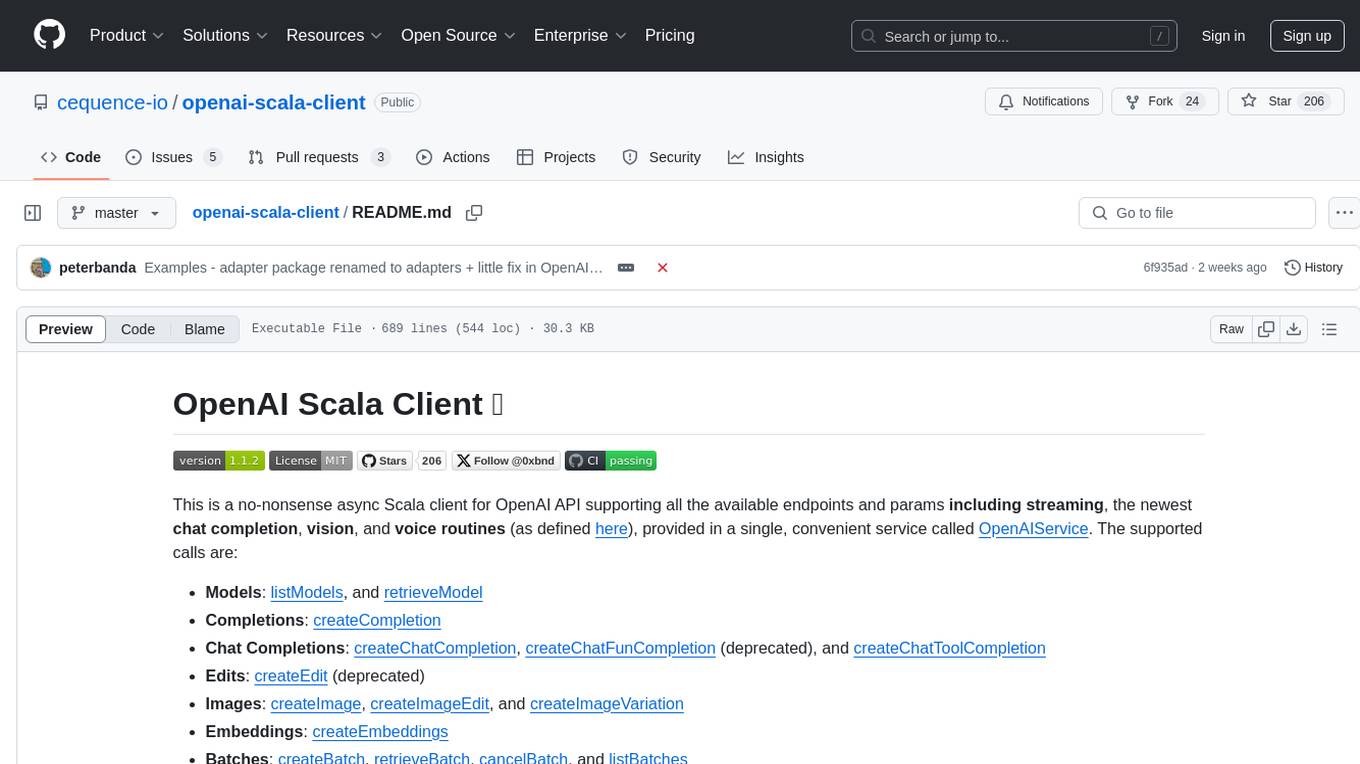
openai-scala-client
This is a no-nonsense async Scala client for OpenAI API supporting all the available endpoints and params including streaming, chat completion, vision, and voice routines. It provides a single service called OpenAIService that supports various calls such as Models, Completions, Chat Completions, Edits, Images, Embeddings, Batches, Audio, Files, Fine-tunes, Moderations, Assistants, Threads, Thread Messages, Runs, Run Steps, Vector Stores, Vector Store Files, and Vector Store File Batches. The library aims to be self-contained with minimal dependencies and supports API-compatible providers like Azure OpenAI, Azure AI, Anthropic, Google Vertex AI, Groq, Grok, Fireworks AI, OctoAI, TogetherAI, Cerebras, Mistral, Deepseek, Ollama, FastChat, and more.
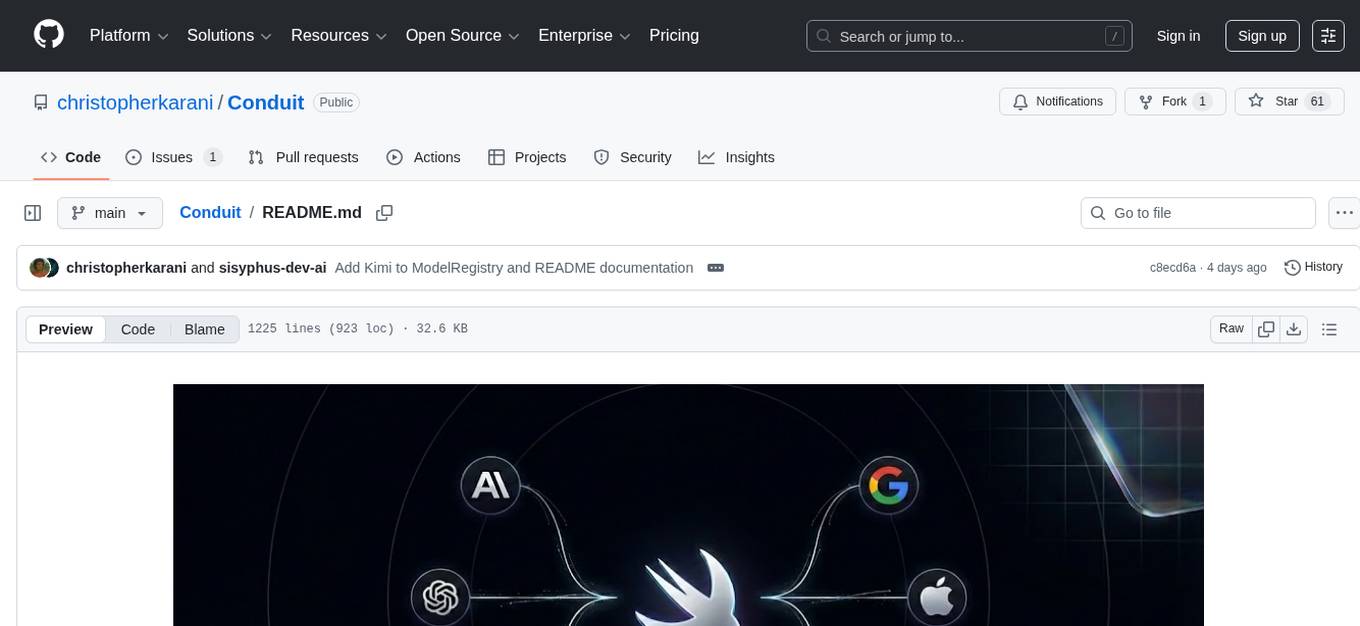
Conduit
Conduit is a unified Swift 6.2 SDK for local and cloud LLM inference, providing a single Swift-native API that can target Anthropic, OpenRouter, Ollama, MLX, HuggingFace, and Apple’s Foundation Models without rewriting your prompt pipeline. It allows switching between local, cloud, and system providers with minimal code changes, supports downloading models from HuggingFace Hub for local MLX inference, generates Swift types directly from LLM responses, offers privacy-first options for on-device running, and is built with Swift 6.2 concurrency features like actors, Sendable types, and AsyncSequence.
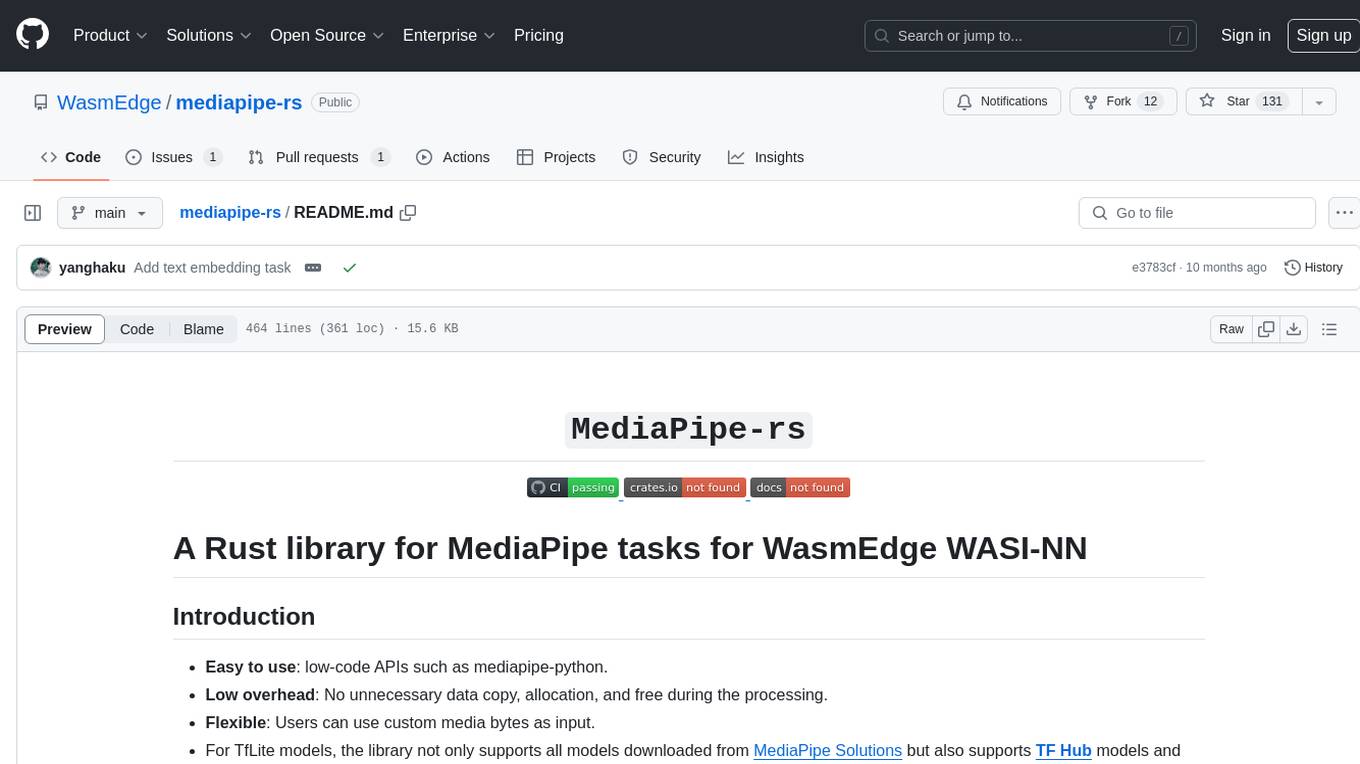
mediapipe-rs
MediaPipe-rs is a Rust library designed for MediaPipe tasks on WasmEdge WASI-NN. It offers easy-to-use low-code APIs similar to mediapipe-python, with low overhead and flexibility for custom media input. The library supports various tasks like object detection, image classification, gesture recognition, and more, including TfLite models, TF Hub models, and custom models. Users can create task instances, run sessions for pre-processing, inference, and post-processing, and speed up processing by reusing sessions. The library also provides support for audio tasks using audio data from symphonia, ffmpeg, or raw audio. Users can choose between CPU, GPU, or TPU devices for processing.
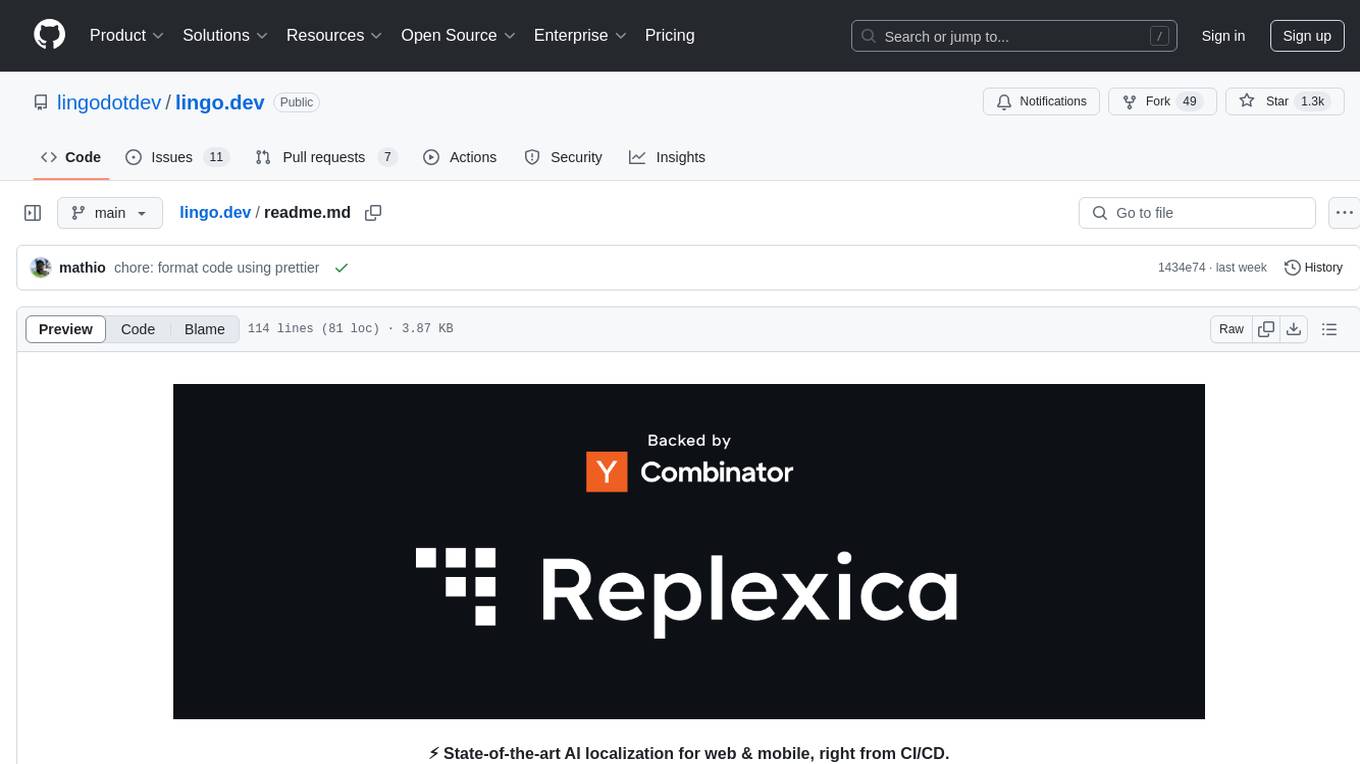
lingo.dev
Replexica AI automates software localization end-to-end, producing authentic translations instantly across 60+ languages. Teams can do localization 100x faster with state-of-the-art quality, reaching more paying customers worldwide. The tool offers a GitHub Action for CI/CD automation and supports various formats like JSON, YAML, CSV, and Markdown. With lightning-fast AI localization, auto-updates, native quality translations, developer-friendly CLI, and scalability for startups and enterprise teams, Replexica is a top choice for efficient and effective software localization.
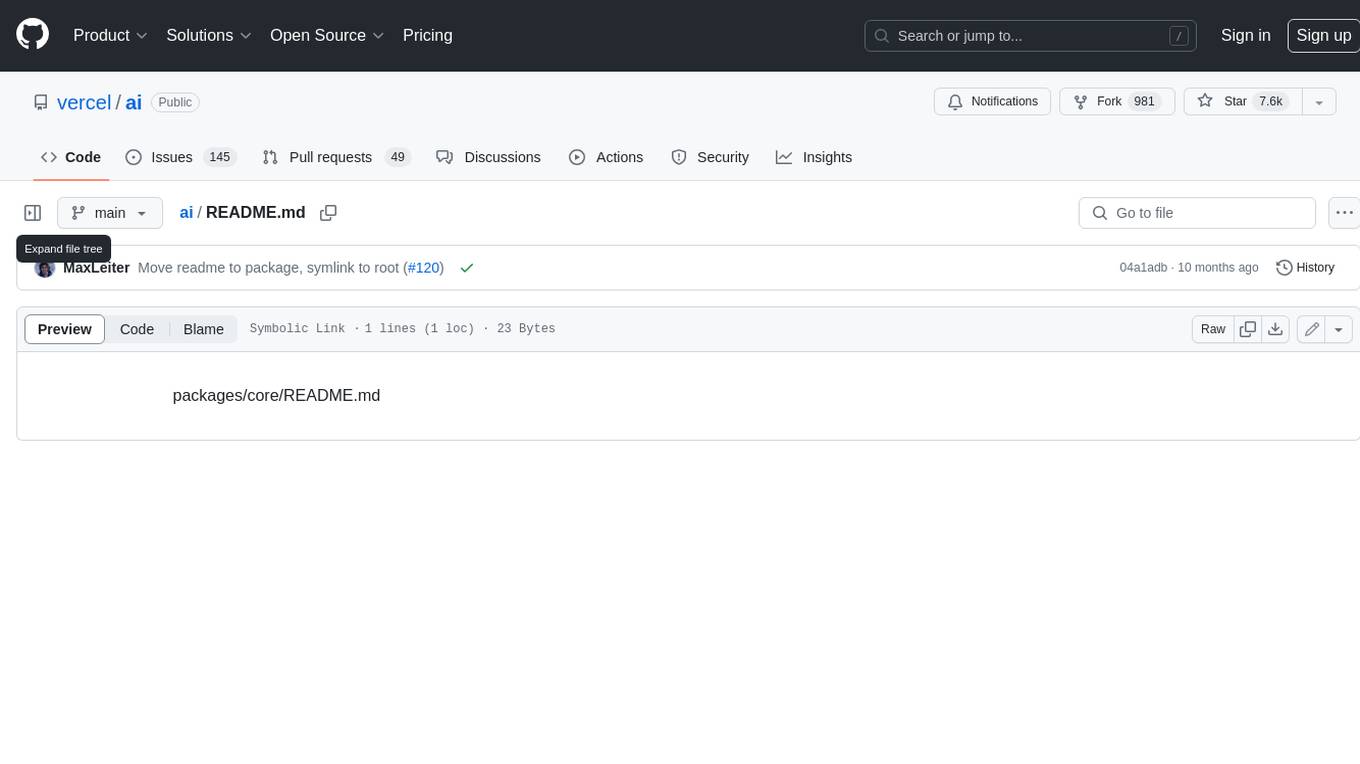
ai
The Vercel AI SDK is a library for building AI-powered streaming text and chat UIs. It provides React, Svelte, Vue, and Solid helpers for streaming text responses and building chat and completion UIs. The SDK also includes a React Server Components API for streaming Generative UI and first-class support for various AI providers such as OpenAI, Anthropic, Mistral, Perplexity, AWS Bedrock, Azure, Google Gemini, Hugging Face, Fireworks, Cohere, LangChain, Replicate, Ollama, and more. Additionally, it offers Node.js, Serverless, and Edge Runtime support, as well as lifecycle callbacks for saving completed streaming responses to a database in the same request.
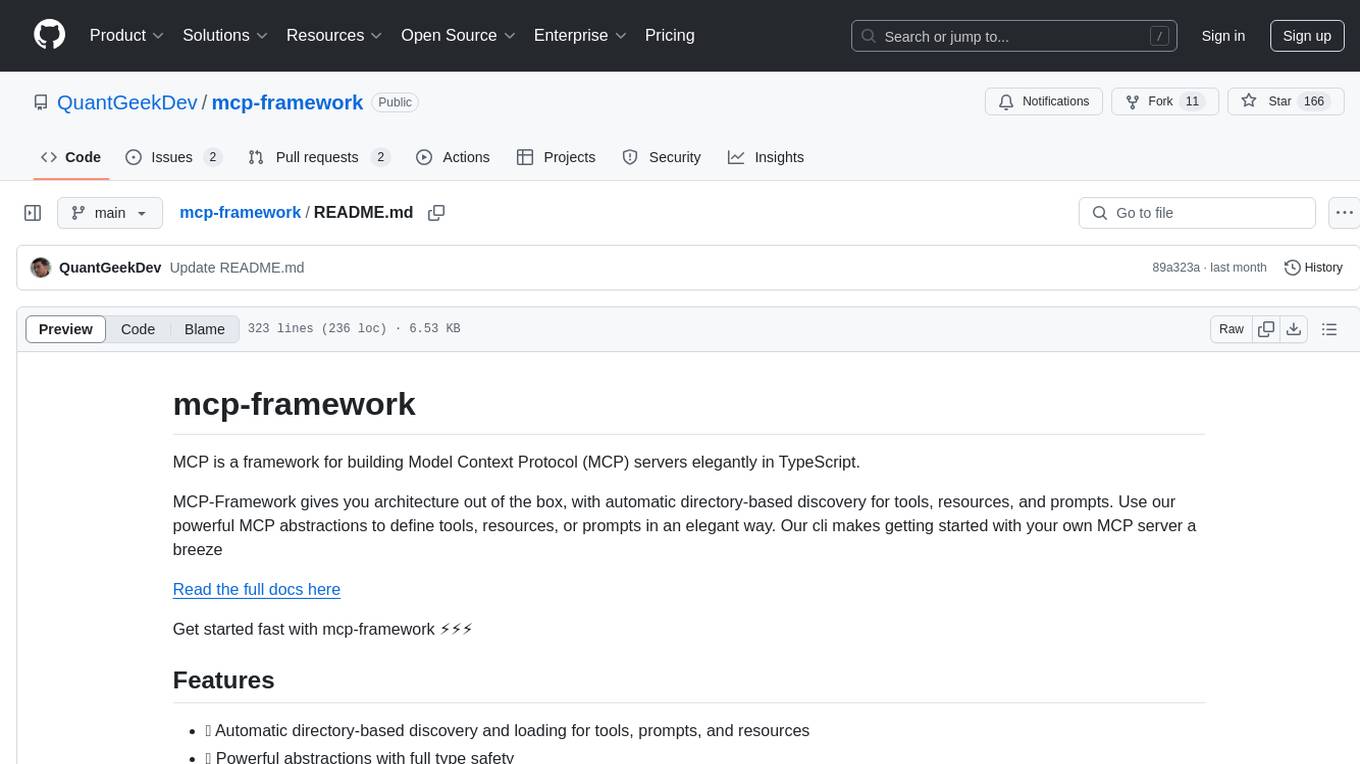
mcp-framework
MCP-Framework is a TypeScript framework for building Model Context Protocol (MCP) servers with automatic directory-based discovery for tools, resources, and prompts. It provides powerful abstractions, simple server setup, and a CLI for rapid development and project scaffolding.
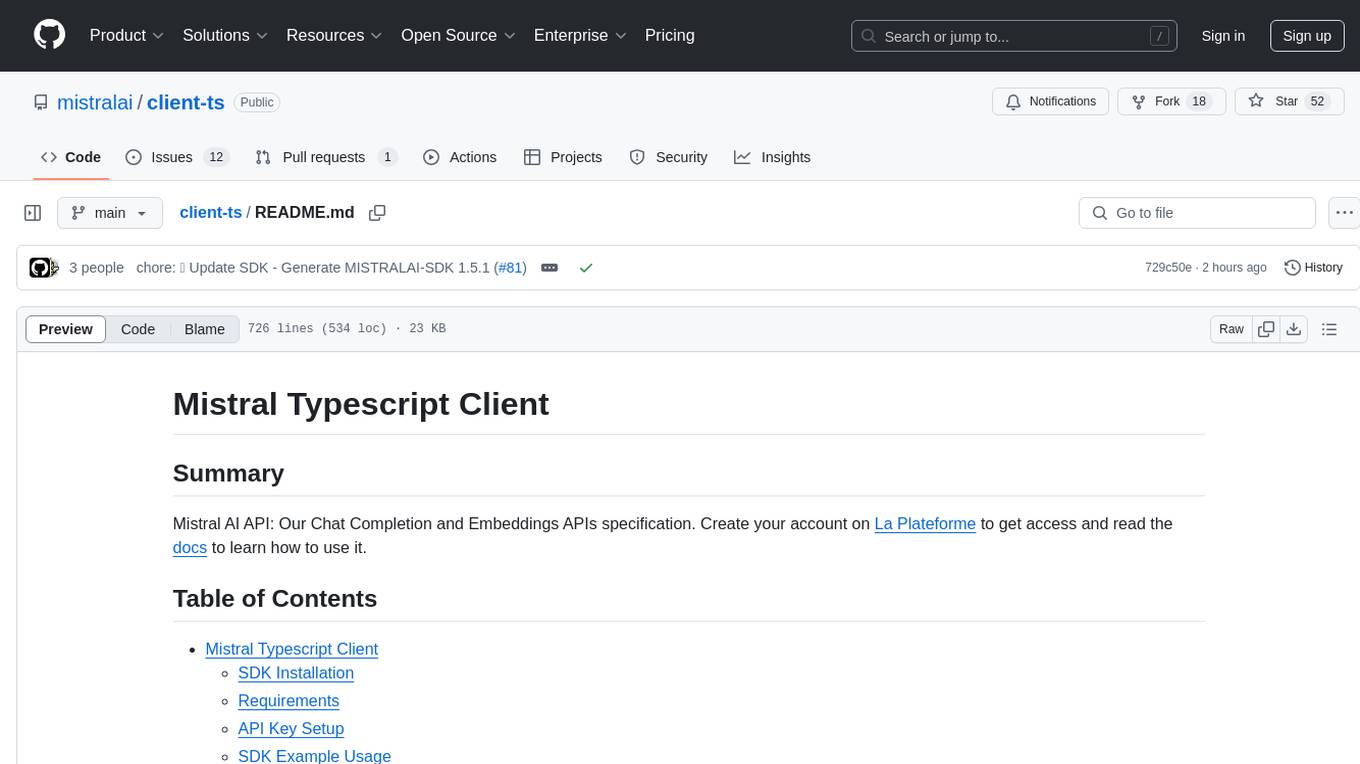
client-ts
Mistral Typescript Client is an SDK for Mistral AI API, providing Chat Completion and Embeddings APIs. It allows users to create chat completions, upload files, create agent completions, create embedding requests, and more. The SDK supports various JavaScript runtimes and provides detailed documentation on installation, requirements, API key setup, example usage, error handling, server selection, custom HTTP client, authentication, providers support, standalone functions, debugging, and contributions.
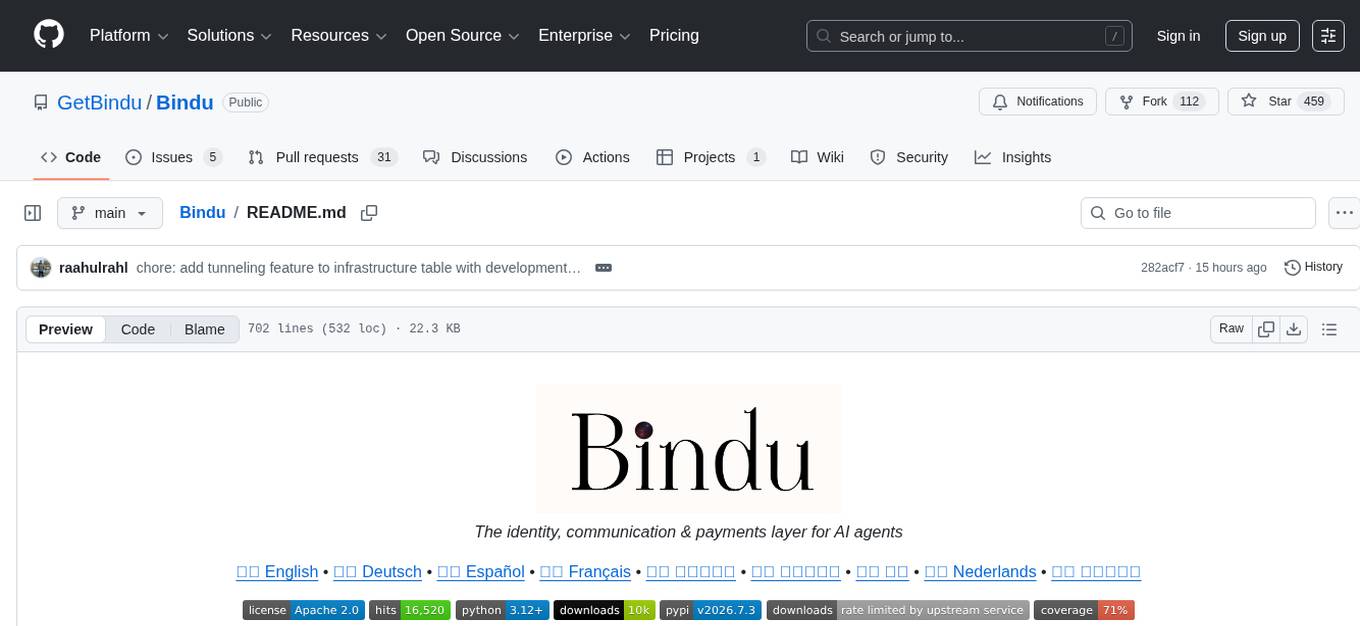
Bindu
Bindu is an operating layer for AI agents that provides identity, communication, and payment capabilities. It delivers a production-ready service with a convenient API to connect, authenticate, and orchestrate agents across distributed systems using open protocols: A2A, AP2, and X402. Built with a distributed architecture, Bindu makes it fast to develop and easy to integrate with any AI framework. Transform any agent framework into a fully interoperable service for communication, collaboration, and commerce in the Internet of Agents.
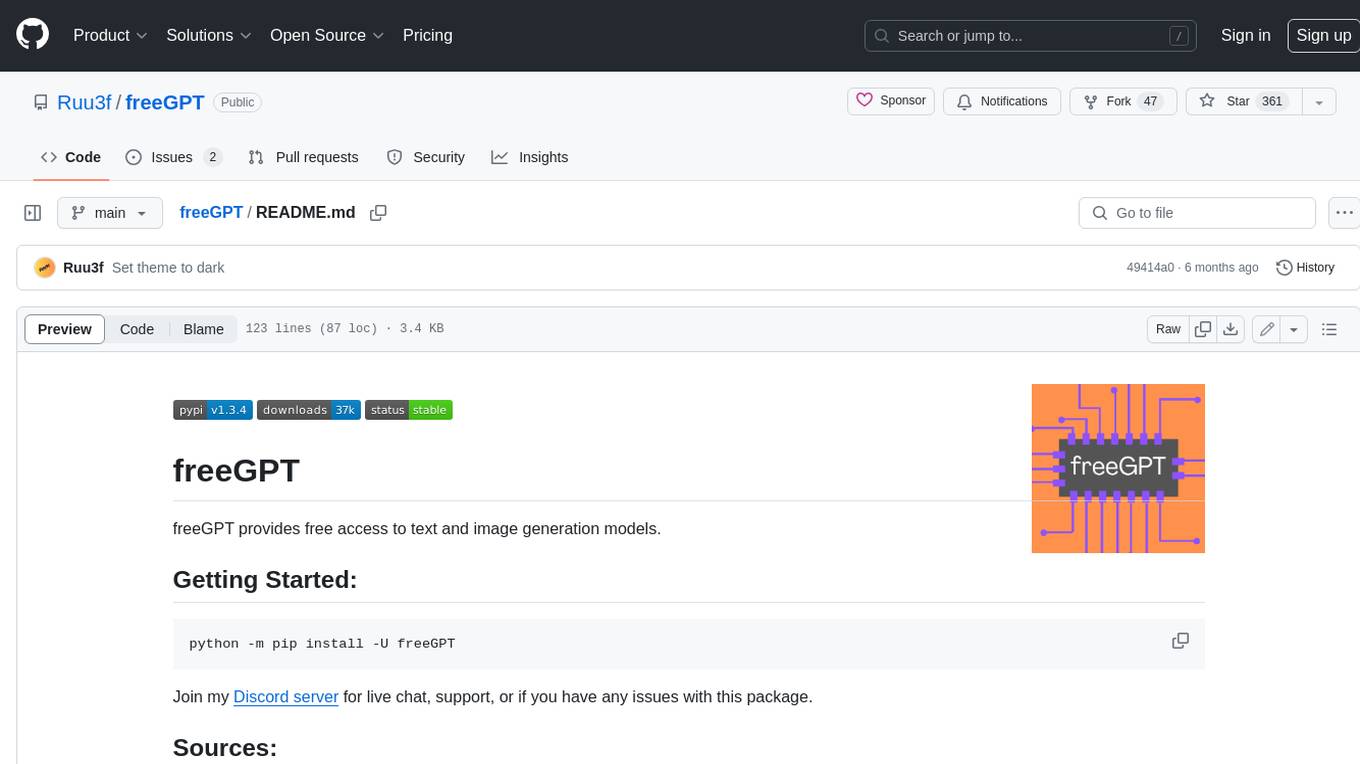
freeGPT
freeGPT provides free access to text and image generation models. It supports various models, including gpt3, gpt4, alpaca_7b, falcon_40b, prodia, and pollinations. The tool offers both asynchronous and non-asynchronous interfaces for text completion and image generation. It also features an interactive Discord bot that provides access to all the models in the repository. The tool is easy to use and can be integrated into various applications.
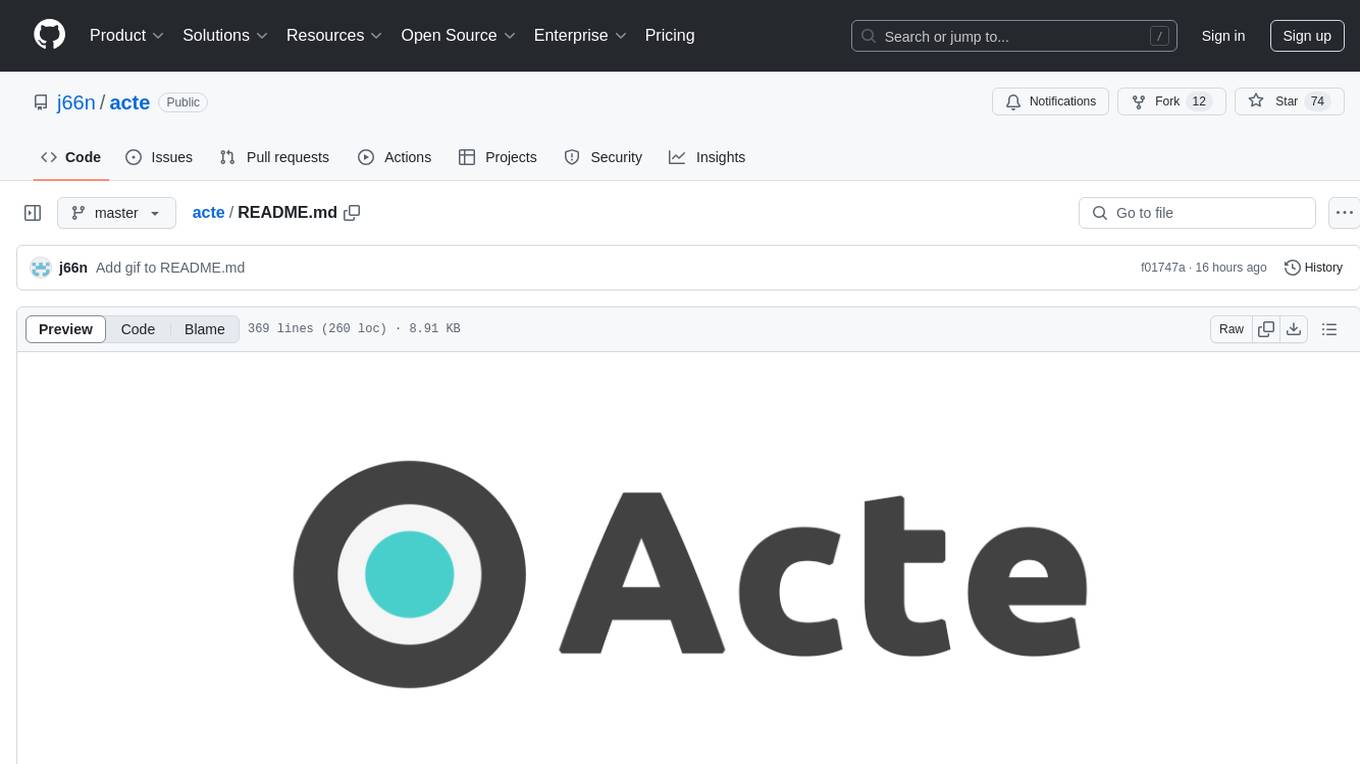
acte
Acte is a framework designed to build GUI-like tools for AI Agents. It aims to address the issues of cognitive load and freedom degrees when interacting with multiple APIs in complex scenarios. By providing a graphical user interface (GUI) for Agents, Acte helps reduce cognitive load and constraints interaction, similar to how humans interact with computers through GUIs. The tool offers APIs for starting new sessions, executing actions, and displaying screens, accessible via HTTP requests or the SessionManager class.
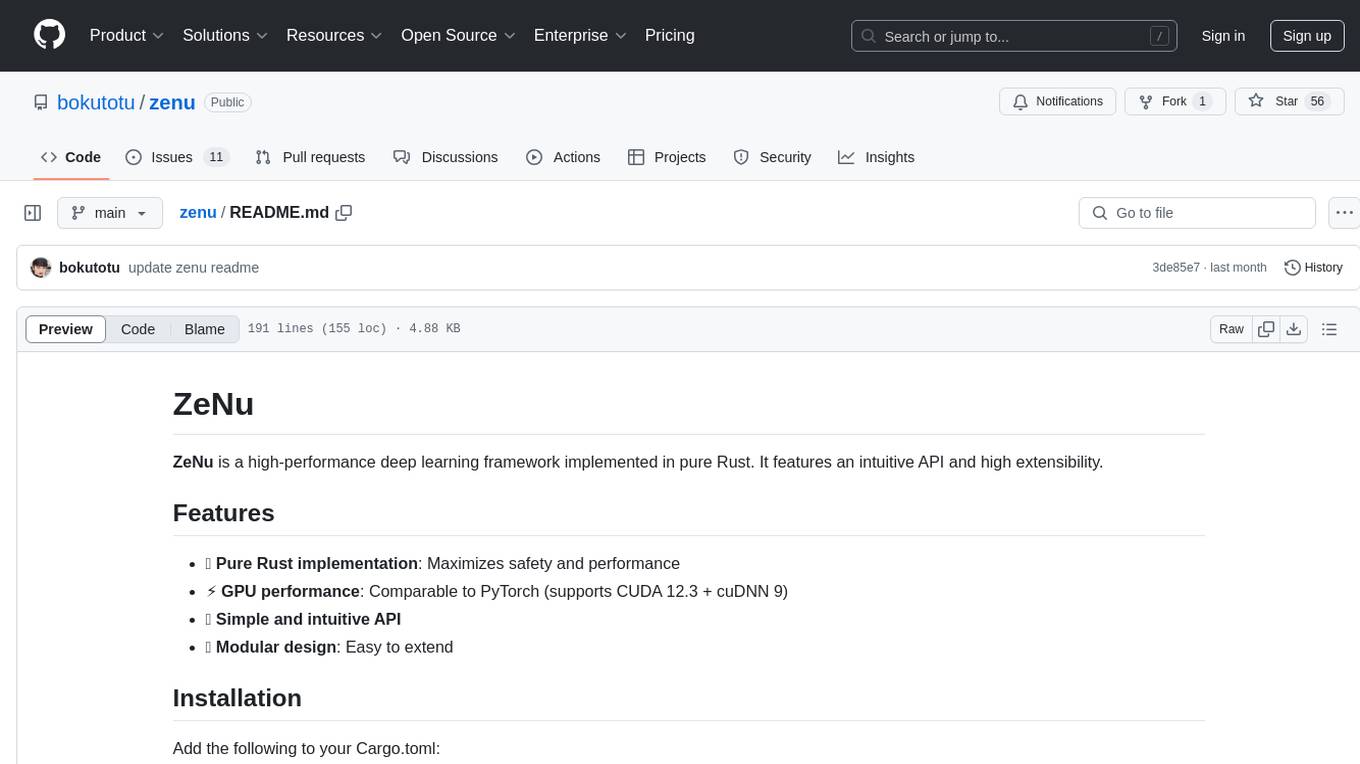
zenu
ZeNu is a high-performance deep learning framework implemented in pure Rust, featuring a pure Rust implementation for safety and performance, GPU performance comparable to PyTorch with CUDA support, a simple and intuitive API, and a modular design for easy extension. It supports various layers like Linear, Convolution 2D, LSTM, and optimizers such as SGD and Adam. ZeNu also provides device support for CPU and CUDA (NVIDIA GPU) with CUDA 12.3 and cuDNN 9. The project structure includes main library, automatic differentiation engine, neural network layers, matrix operations, optimization algorithms, CUDA implementation, and other support crates. Users can find detailed implementations like MNIST classification, CIFAR10 classification, and ResNet implementation in the examples directory. Contributions to ZeNu are welcome under the MIT License.
For similar tasks

island-ai
island-ai is a TypeScript toolkit tailored for developers engaging with structured outputs from Large Language Models. It offers streamlined processes for handling, parsing, streaming, and leveraging AI-generated data across various applications. The toolkit includes packages like zod-stream for interfacing with LLM streams, stream-hooks for integrating streaming JSON data into React applications, and schema-stream for JSON streaming parsing based on Zod schemas. Additionally, related packages like @instructor-ai/instructor-js focus on data validation and retry mechanisms, enhancing the reliability of data processing workflows.
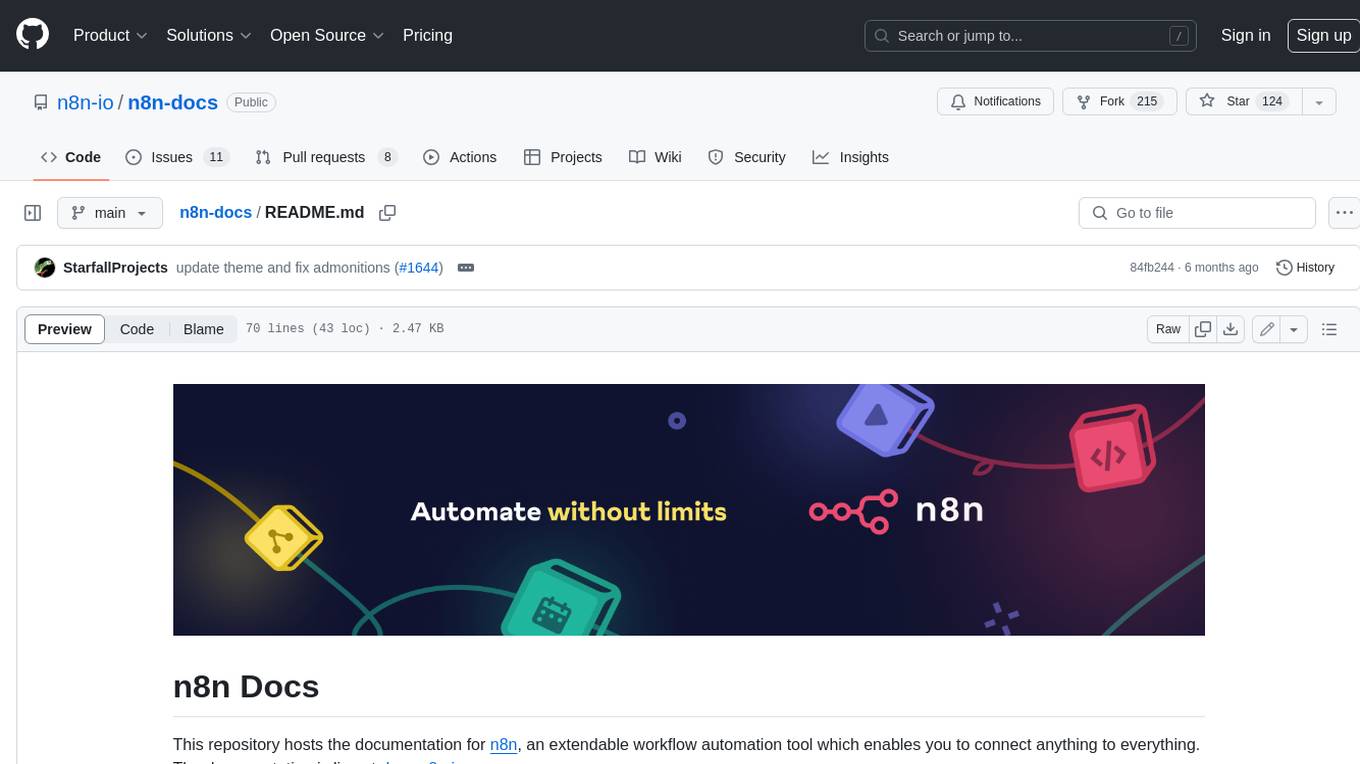
n8n-docs
n8n is an extendable workflow automation tool that enables you to connect anything to everything. It is open-source and can be self-hosted or used as a service. n8n provides a visual interface for creating workflows, which can be used to automate tasks such as data integration, data transformation, and data analysis. n8n also includes a library of pre-built nodes that can be used to connect to a variety of applications and services. This makes it easy to create complex workflows without having to write any code.
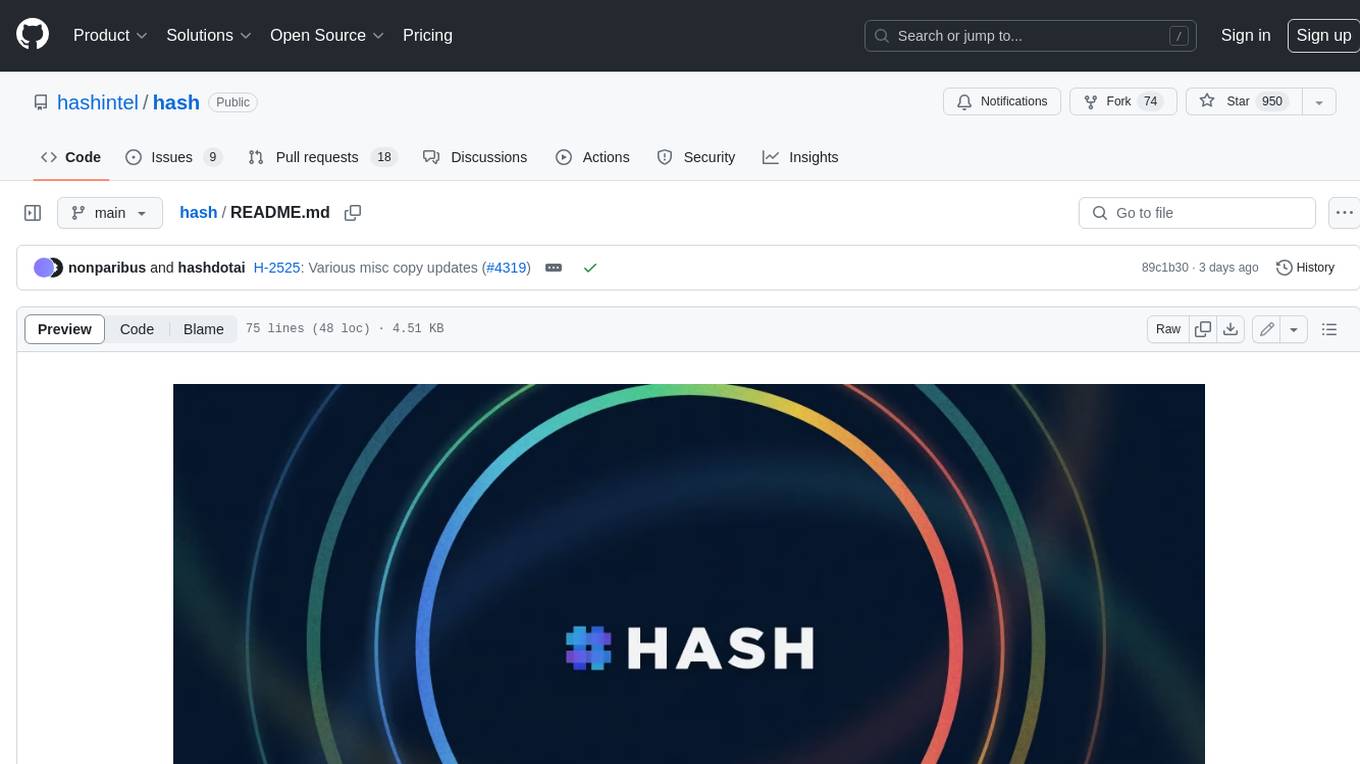
hash
HASH is a self-building, open-source database which grows, structures and checks itself. With it, we're creating a platform for decision-making, which helps you integrate, understand and use data in a variety of different ways.
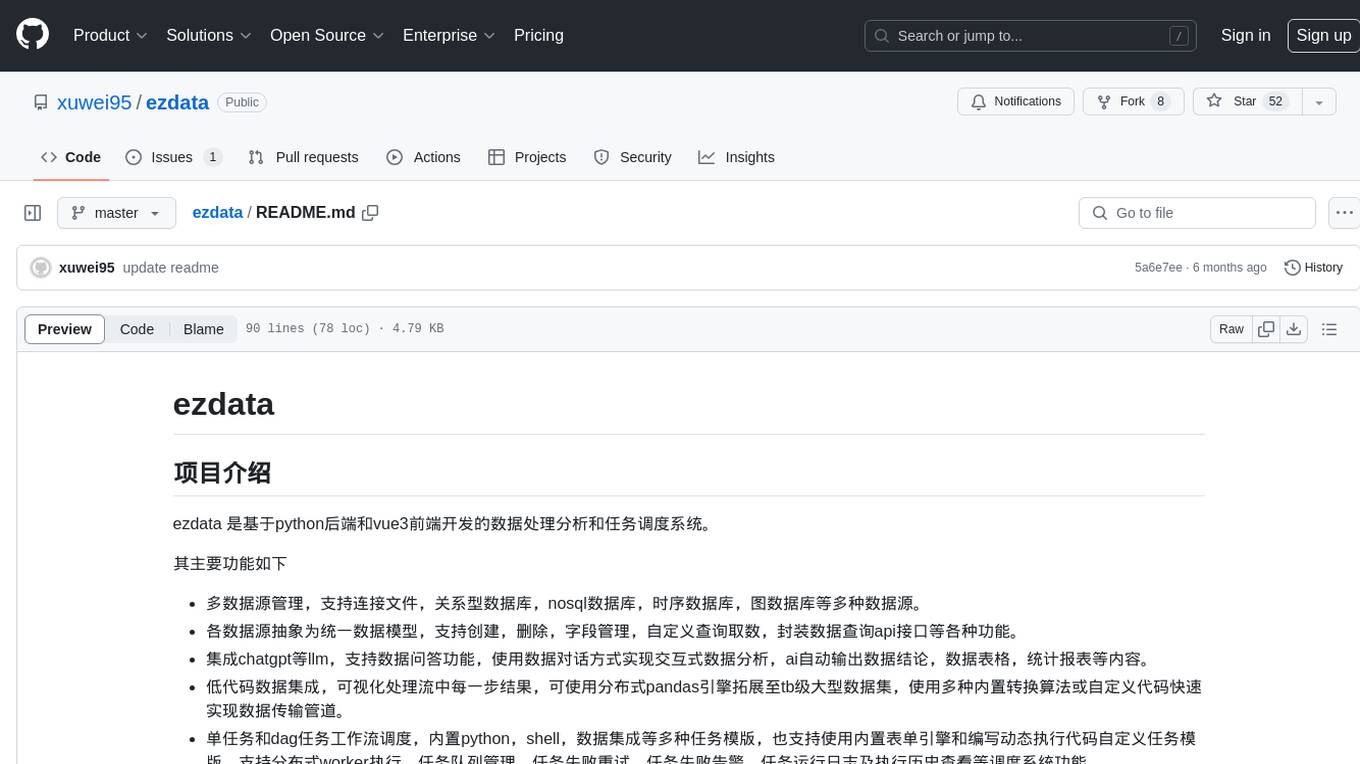
ezdata
Ezdata is a data processing and task scheduling system developed based on Python backend and Vue3 frontend. It supports managing multiple data sources, abstracting various data sources into a unified data model, integrating chatgpt for data question and answer functionality, enabling low-code data integration and visualization processing, scheduling single and dag tasks, and integrating a low-code data visualization dashboard system.

buildel
Buildel is an AI automation platform that empowers users to create versatile workflows without writing code. It supports multiple providers and interfaces, offers pre-built use cases, and allows users to bring their own API keys. Ideal for AI-powered document retrieval, conversational interfaces, and data integration. Users can get started at app.buildel.ai or run Buildel locally with Node.js, Elixir/Erlang, Docker, Git, and JQ installed. Join the community on Discord for support and discussions.
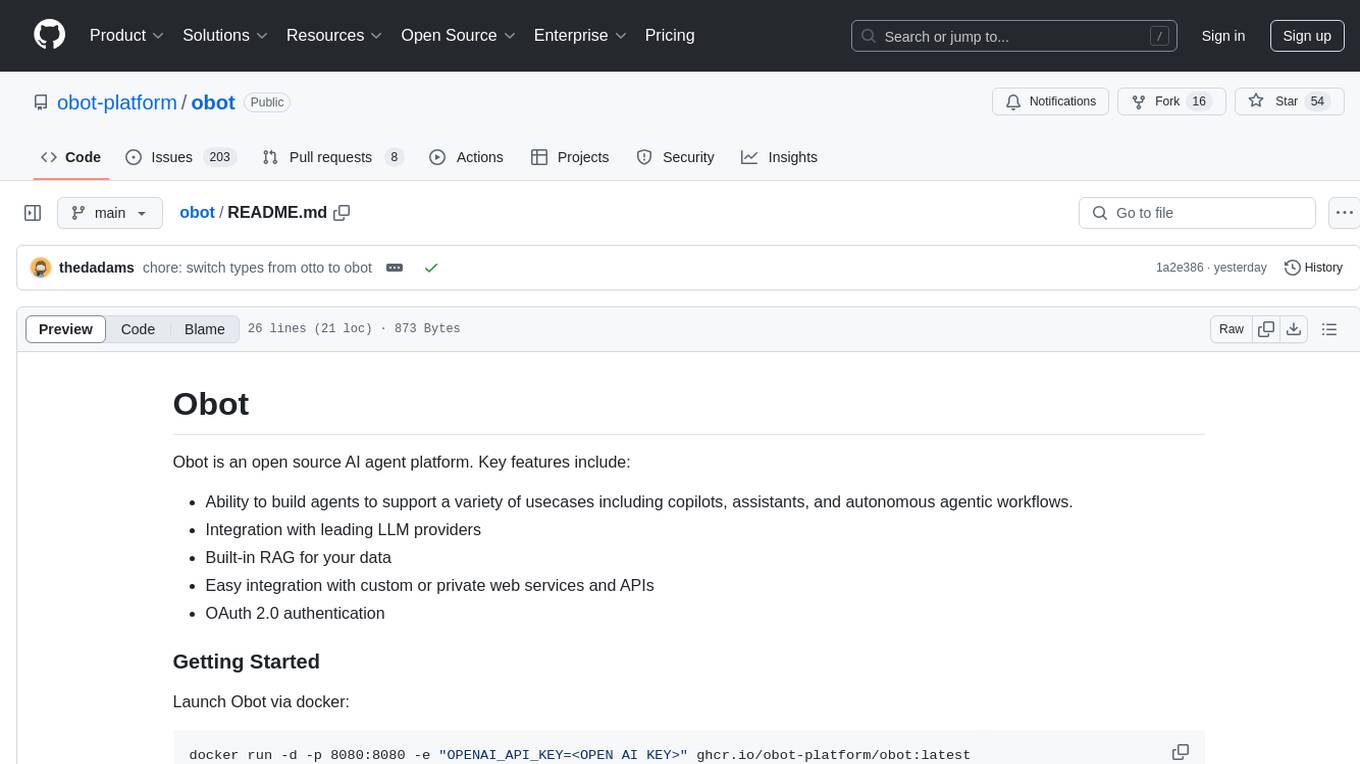
obot
Obot is an open source AI agent platform that allows users to build agents for various use cases such as copilots, assistants, and autonomous workflows. It offers integration with leading LLM providers, built-in RAG for data, easy integration with custom web services and APIs, and OAuth 2.0 authentication.
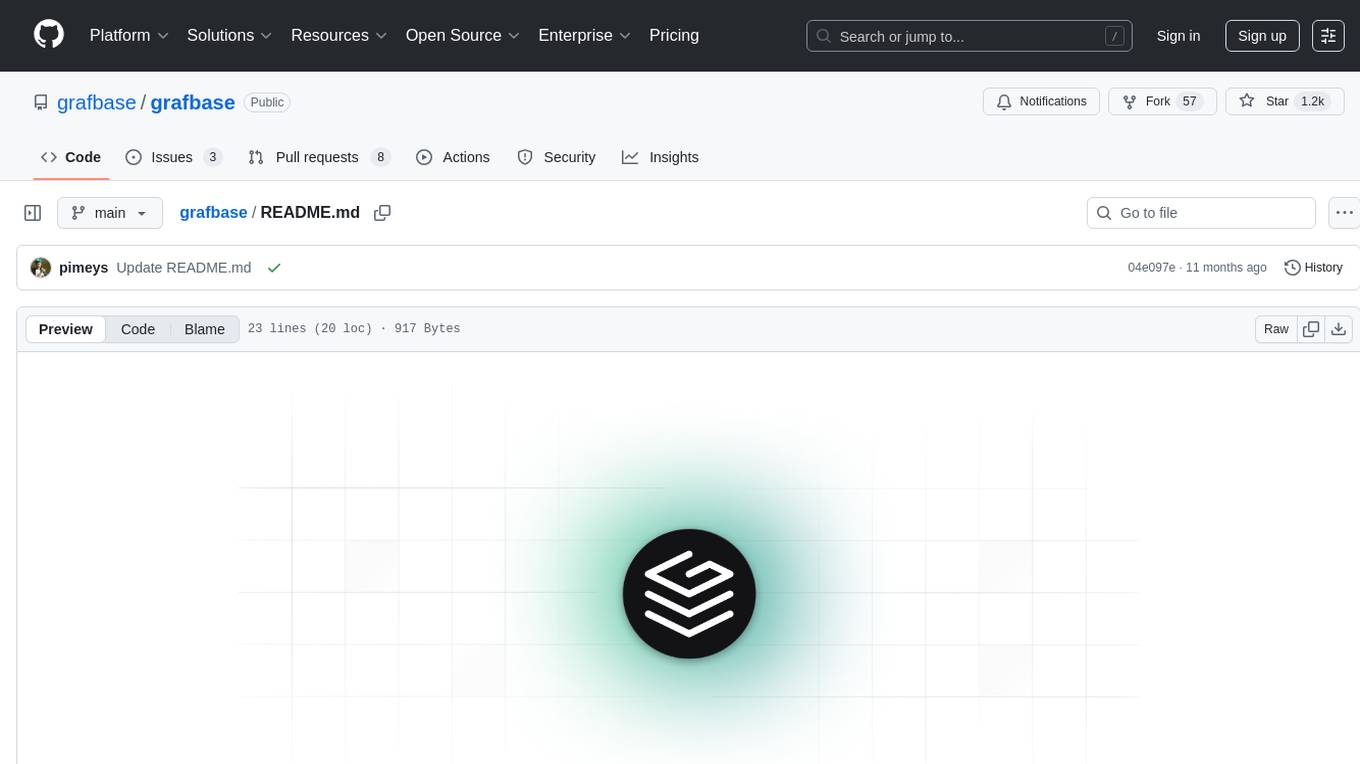
grafbase
Grafbase is a GraphQL Federation platform that allows users to compose all their data sources into a unified graph. It helps users move faster without breaking things by providing advanced governance and analytics features.
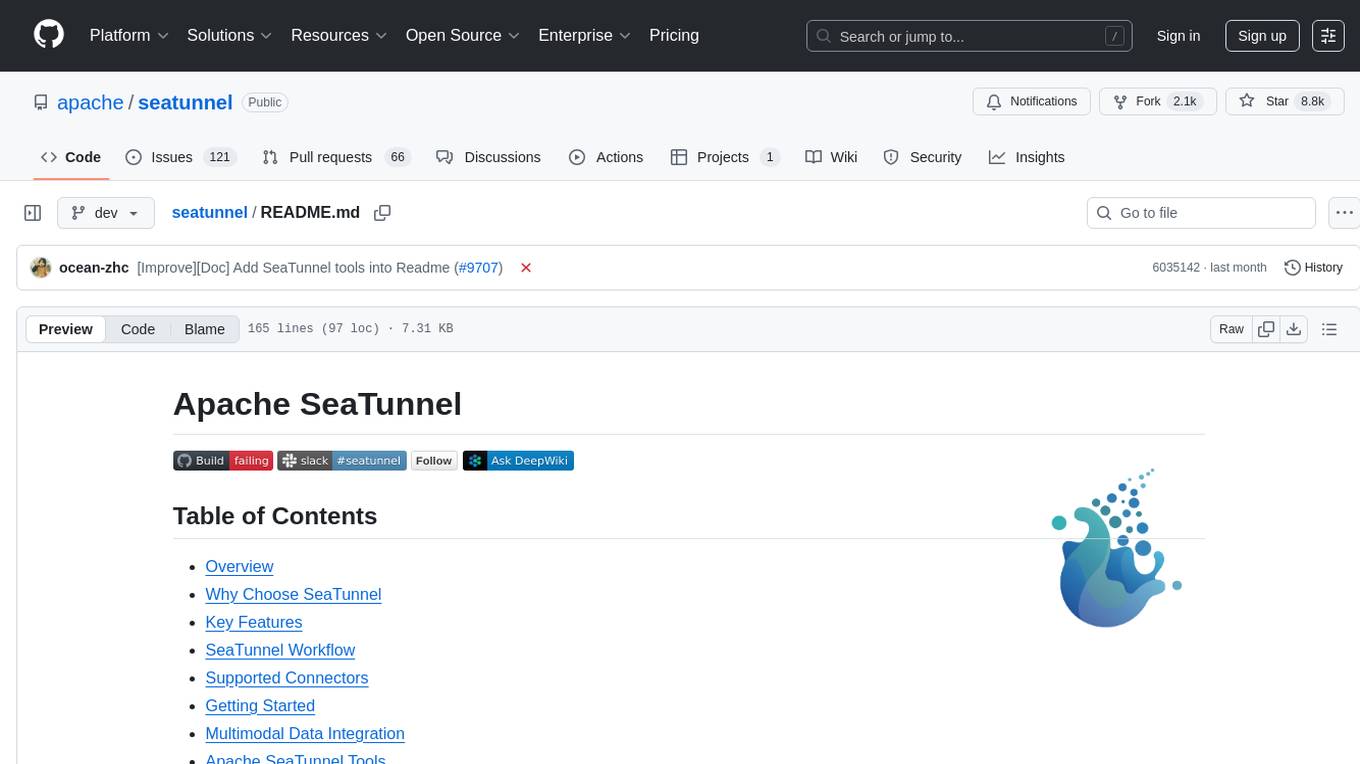
seatunnel
SeaTunnel is a high-performance, distributed data integration tool trusted by numerous companies for synchronizing vast amounts of data daily. It addresses common data integration challenges by seamlessly integrating with diverse data sources, supporting multimodal data integration, complex synchronization scenarios, resource efficiency, and quality monitoring. With over 100 connectors, SeaTunnel offers batch-stream integration, distributed snapshot algorithm, multi-engine support, JDBC multiplexing, and log parsing. It provides high throughput, low latency, real-time monitoring, and supports two job development methods. Users can configure jobs, select execution engines, and parallelize data using source connectors. SeaTunnel also supports multimodal data integration, Apache SeaTunnel tools, real-world use cases, and visual management of jobs through the SeaTunnel Web Project.
For similar jobs

sweep
Sweep is an AI junior developer that turns bugs and feature requests into code changes. It automatically handles developer experience improvements like adding type hints and improving test coverage.

teams-ai
The Teams AI Library is a software development kit (SDK) that helps developers create bots that can interact with Teams and Microsoft 365 applications. It is built on top of the Bot Framework SDK and simplifies the process of developing bots that interact with Teams' artificial intelligence capabilities. The SDK is available for JavaScript/TypeScript, .NET, and Python.

ai-guide
This guide is dedicated to Large Language Models (LLMs) that you can run on your home computer. It assumes your PC is a lower-end, non-gaming setup.

classifai
Supercharge WordPress Content Workflows and Engagement with Artificial Intelligence. Tap into leading cloud-based services like OpenAI, Microsoft Azure AI, Google Gemini and IBM Watson to augment your WordPress-powered websites. Publish content faster while improving SEO performance and increasing audience engagement. ClassifAI integrates Artificial Intelligence and Machine Learning technologies to lighten your workload and eliminate tedious tasks, giving you more time to create original content that matters.

chatbot-ui
Chatbot UI is an open-source AI chat app that allows users to create and deploy their own AI chatbots. It is easy to use and can be customized to fit any need. Chatbot UI is perfect for businesses, developers, and anyone who wants to create a chatbot.

BricksLLM
BricksLLM is a cloud native AI gateway written in Go. Currently, it provides native support for OpenAI, Anthropic, Azure OpenAI and vLLM. BricksLLM aims to provide enterprise level infrastructure that can power any LLM production use cases. Here are some use cases for BricksLLM: * Set LLM usage limits for users on different pricing tiers * Track LLM usage on a per user and per organization basis * Block or redact requests containing PIIs * Improve LLM reliability with failovers, retries and caching * Distribute API keys with rate limits and cost limits for internal development/production use cases * Distribute API keys with rate limits and cost limits for students

uAgents
uAgents is a Python library developed by Fetch.ai that allows for the creation of autonomous AI agents. These agents can perform various tasks on a schedule or take action on various events. uAgents are easy to create and manage, and they are connected to a fast-growing network of other uAgents. They are also secure, with cryptographically secured messages and wallets.

griptape
Griptape is a modular Python framework for building AI-powered applications that securely connect to your enterprise data and APIs. It offers developers the ability to maintain control and flexibility at every step. Griptape's core components include Structures (Agents, Pipelines, and Workflows), Tasks, Tools, Memory (Conversation Memory, Task Memory, and Meta Memory), Drivers (Prompt and Embedding Drivers, Vector Store Drivers, Image Generation Drivers, Image Query Drivers, SQL Drivers, Web Scraper Drivers, and Conversation Memory Drivers), Engines (Query Engines, Extraction Engines, Summary Engines, Image Generation Engines, and Image Query Engines), and additional components (Rulesets, Loaders, Artifacts, Chunkers, and Tokenizers). Griptape enables developers to create AI-powered applications with ease and efficiency.






